Housing Series: From the Field, Reflections From Two Dow Corning Leaders on Building a BoP Market
Editor’s Note: NextBillion has launched month-long series on Housing for All in partnership with Ashoka. Please follow the series HERE and join the discussion with your thoughts and insights.
Earlier today, Dow Corning Director of Discovery Chip Reeves posted on the value of its Citizen Service Corps, which sends employees around the world to see, hear and think about what new markets need, and come back ready to translate those insights into innovations and new products. The posts below are excerpts from two employees who worked on Housing for All in India as their volunteer experience. Dow Corning posted all their volunteers’ posts on an internal blogsite for all of its thousands of employees around the world, many of whom eagerly awaited the next installment of insights and photos from the field. NextBillion would like to thank these employees and Dow Corning for sharing their views from the field.
What I Learned About Housing for All in India
By Ronda Grosse
In Dow Corning’s Business & Technology Incubator, we focus on research and development and new business opportunities in areas such as renewable energy, building materials, electronics and lighting as we explore sustainable ways that our company can create positive change in the world. My work and my personal passion to make a difference led me to participate in Dow Corning’s Citizen Service Corps, to work with the Housing for All pilot project initiated by Ashoka in Bangalore, India.
We were part of a team tasked with drafting new energy requirements for affordable housing that will be set forth for people living in slums so national standards can guide better, safer construction practices. We interviewed urban planners, developers, architects, engineers, citizen sector organizations and university scholars in order to gain insight into affordable housing needs in India. And we spent time talking with families living in slums and other low-income communities in Bangalore, allowing us to gain deeper insights into their daily lives and challenges. These personal interactions encouraged us to remain steadfast in our attempts to develop innovative solutions that would be a step forward toward improving the quality of their lives.
This experience reinforced my belief that in order to gain true understanding and develop worthwhile innovations, it is important to experience firsthand the challenges faced by those we are seeking to help. My outlook was broadened and my ideas about finding impactful solutions to problems changed as a result.
While the challenges are immense, I was inspired to witness the resolve of the human spirit, where joy was evident amidst great poverty, and creativity was brought to bear in so many ways as each person provided for his or her family and those in their community. I am grateful for those who work tirelessly to achieve better living conditions, and for the partnerships that are being established across the globe to shape solutions together.
Below are excerpts and photos my colleagues and I sent back from India:
Contrast
While walking in a different part of the city today, we came across significant variety in the type of houses on the same street. Here are two examples.
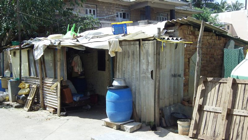
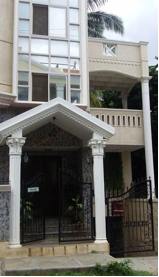
Posted by Ronda Grosse 09/15/2010 at 02:08:01 PM
First round of interviews
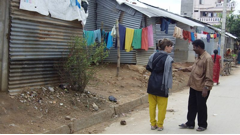
We spent the majority of today talking to various people about the current living conditions of the Indian families we came here to help. This included Ashoka fellow, Alphonse Jemonie, pictured in Frank’s blog, who has done so much for the citizens of Bangalore over the past 25 years. I am thankful to have a great team in Sylvie, ARV and Frank, who are each bringing different perspectives and approaches to our project. ARV’s background in civil/structural engineering coupled with his knowledge of India are an immense help. Today he was able to take the lead with questioning in the proper language – thanks ARV! Here are a few photos:
Posted by ARV 09/28/2010 at 03:02:00 AM
Good Insight in to Urban Housing Problem
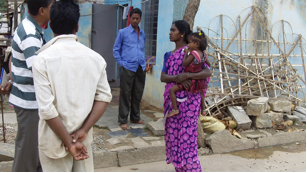
Monday we met Mr B.R.Balachadran, Managing Director of Alchemy Urban Systems. He is also executive director of DBS affordable home strategy limited. He wears multiple hats as urban developer, property developer and architect. Mr Bala has in-depth knowledge on the subject of urban development and he was kind enough to spare 3 long hours to explain the problem and answering to our questions. At the end, we got quite a good insight into the problem.
Here are some of the important points we understood after hearing Mr Bala.
- Currently government regulations don’t allow dwellings less than 24 Sq.m. But the people are living in illegal colonies in the size less than 24 Sq.m. for rent which are by and large controlled by slum thugs. If government allows the market to build homes of size less than 24 Sq.m and with common toilet, people can buy and live in those houses. It becomes sustainable model for them instead of living in a rental house forever. This will really elevate the standard of living of the people in incremental way.
- The floor space index (FSI) should be governed by the infrastructure available or expected. So naturally there can’t be a single FSI which holds good for the entire city. Ahmadabad and Hyderabad are the two cities following this strategy. FSI relaxations should not be made special for affordable homes ignoring the infrastructure.
- The building regulations should consider design (like how good ventilation is achieved) than just insisting on flat rules on clearance, offset etc. Obviously the current official machinery may not be equipped to evaluate the performance of designs submitted. They need to adapt the model to get proper auditors for the task.
- Rules should be relaxed on elevators usage.
- No special concessions are needed for the affordable home sector as special, whereas the whole regulation process for the building industry should be clear. This will create a healthy market for many players to come in.
- Delays in getting building permits are big burden on developer due to the interest on the money borrowed and price escalations.
- The big ticket items in affordable homes are Stamp duty, Cement, Steel, Aggregate, and Energy — apart from the land cost.
- The affordable home customers are focused on date of delivery and quality of work.
- Bringing new technology to accelerate the housing construction and modular techniques will be very useful. They are important to fight escalation of prices, quality flaws and delay in delivery.
- When developing the TATA Nano (world’s economical car) the instruction given to the team was do not strip down to make it economical but RE-ENGINEER the whole car to make it economical. The same approach should be made in achieving the affordable homes also.
Retraining myself to see, give thanks and be a changemaker
By Frank DeLano
I have traveled to many different countries for my work at Dow Corning, so I felt prepared for what I would experience during my Global Citizen Service Corps trip to work with Ashoka’s Housing for All program in Bangalore, India. I quickly realized that my past travel, the quality hotels, the transportation we took to work and the beautiful office buildings at Dow Corning sites around the world, had raised expectations that would not hold in India. From the first day in Bangalore, I realized how careful I need to be not be bound by my past, and limited, experiences. I need to be in the present : Limitless.
Our hotel in Bangalore – The Haven — and our first excursion into the local areas convinced me this was going to be a life-changing experience. When I wake up each morning (at home or in a Dow Corning trip), I expect a hot shower, breakfast, and a simple (no traffic congestion) trip to work in my well maintained automobile. Never did this occur during my month in Bangalore! Having water in the morning for a shower was not a given, breakfast was an adventure of foods I’d never had at that hour in the morning. We walked to work through streets congested diverse vehicles: cars, rickshaws, motorbikes, pedal bicycles –and cows. I learned to appreciate what was provided to me and to feel: Gratitude.
Over the years I’ve been the sort of person and employee who always tries to make a difference in everything I attempted. In Bangalore, attempting to make a difference in how to achieve affordable housing for millions of people living in poverty, what I realized was that my world was very small. My attempts were to make a difference at Dow Corning, in Bay City, Michigan, in my family. All good and worthy. But the professionals we worked with at Ashoka ,India were trying to make a difference to all of India and eventually other countries in the world. I learned that each person has a purpose, whether large or small, and that everyone can make a difference. Through this work, I learned that I, like those around me who will continue on in India, could learn to be a skilled: Changemaker.
Below are some of the blogposts I sent home:
Posted by Frank DeLano 09/15/2010 at 09:10:56 AM
A few photos from today’s trip to see inadequate housing….
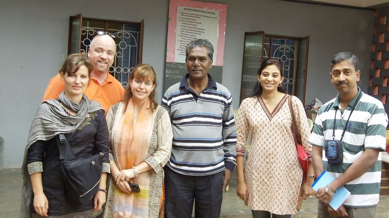
(Above_Our team with Ashoka Fellow Alphonse Jemonie.
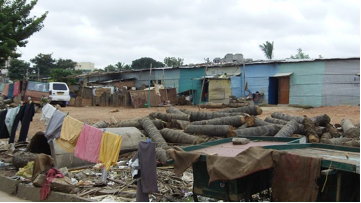
(Government built and subsidized public housing in Bangalore).
Posted by Frank DeLano 09/27/2010 at 10:09:17 AM
Reform or Subsidize… Affordable Housing for the Masses … and more photos
How do you make affordable housing available to the masses? Do you provide subsidies or do you reform the system? Or, is it a delicate balance of both?
That was the question that remained in my head today after meeting wtih B. R. Balachandran (Bala) a Urban Planner, Architect, and Developer.
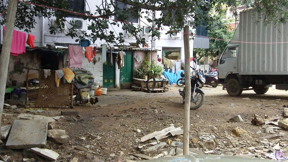
On our walk from The Haven…
I learned what must be considered when approaching a developer to build affordable housing:
1. What are the ongoing maintenance costs of the home for the customer?
2. What are the necessary construction costs to provide a safe/comfortable living space?
For new technology to be implemented, it must address these two points: lower maintenance and construction costs. Also, can the technology shorten the construction cycle? More to think on this one….
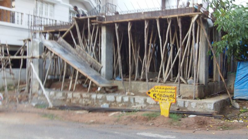
New construction in Bangalore
- Categories
- Uncategorized
